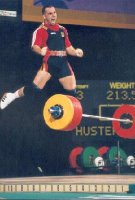Smart, Steady Progress Brings Success
 The old adage "Slow and steady wins the race" has been floating around in my head lately. But I have modified it a bit.
The old adage "Slow and steady wins the race" has been floating around in my head lately. But I have modified it a bit.I attended the National Junior Weightlifting Championships last month in Florida and had the chance to see some very talented athletes compete. Some were vying for spots to compete internationally for Team USA at the Junior World Championships and the Junior Pan Am Championships.
As in all sports, there are some physically and mentally talented athletes who compete beyond their age. These individuals break School-Age (17 under) and Junior (17-20) records; and the sport community becomes very exited to see a potential Olympic champion. And not unlike other sports--swimming and little league baseball come to mind--there are those young super studs that disappear. These wonder kids never make it to the senior ranks or the big leagues, as they break down physically or psychologically, or they just become weary of having spent a childhood pursuing a dream that might not have been their own. The rate at which the athlete progresses is lauded, rather than how the athlete progresses--steady, consistent 6/6 meet performances, demonstration of technique mastery, demonstration of fundamental physical preparation.
One of my personal concerns with any young athlete is the lack of fundamental general physical preparation and the lack of sport-specific technique and physical preparation. You can see this in weightlifting events when the athlete over-reaches--successfully lifts a weight, but does so in spite of significant physical deficiencies. Examples of this include 1) severe valgus movements at the knees, indicating deficient hip strength; 2) loss of neutral spine while pulling from the floor or coming out of the bottom, indicating poor total lower extremity and core strength; 3) the ability to clean a weight, but then not jerk it successfully, due to a lack of hip/core/upper quarter strength with weight overhead; 4) hips out of sync with shoulders off the floor, with an excessively hyperextended neck and lumbar spine, usually indicative of poor posterior chain strength and core stability.
Even though a particular competitive lift might be successful, displays of physical deficiencies would seem to me to be a red flag for regrouping and working on the athlete's "physical scaffolding," laying the basic strength groundwork and making sure proper technique motor patterns are in place. This is in anticipation for the time when the athlete is truly physically ready to make the big lifts and when it really counts--at the senior level, nationally or internationally. If the athlete is allowed and encouraged to constantly over-reach, and fails to fix even the smallest of physical or technical deficiencies, these deficiencies will rear their ugly head in the future. And once these compensations are grooved into the motor system, the chance to revamp technique or the willingness to take the time for the athlete to spend maybe up to 6 months or a year to bring strength levels up to par, has passed.
Records at a young age are nice; they can be very motivating. Consistent performance in competition, mastery of technique and demonstration of fundamental strength mechanics are the hallmarks of good coaching and athlete preparation. The true measure of a good coach is whether or not s/he has the knowledge and the relationship with the athlete to make the athlete understand the importance of smart, steady progress--and the guts to choose it over records--personal or national--when given the choice. Would you rather your athlete become a 13-20 year-old national "has-been" or an athlete with a healthy 5-10 year career at the senior international level? Do you choose hype over health, preparation and smart, steady progress?

Comments